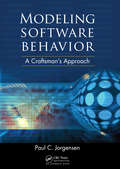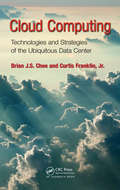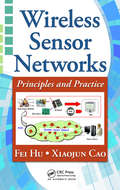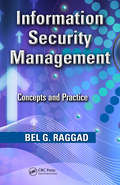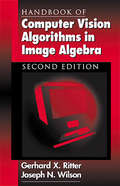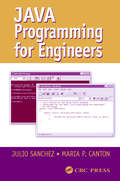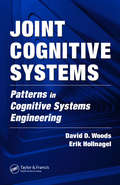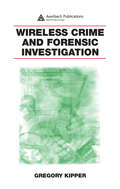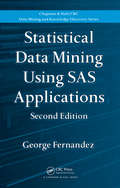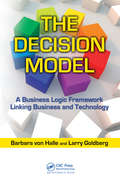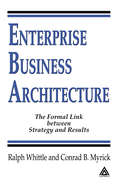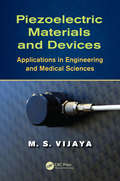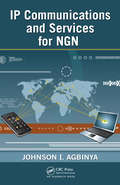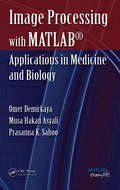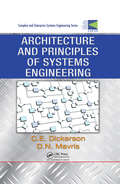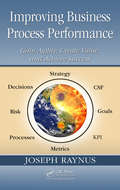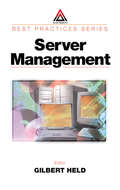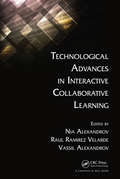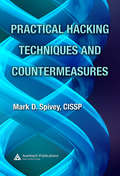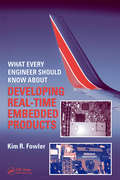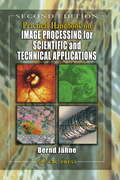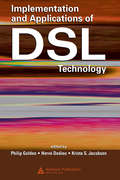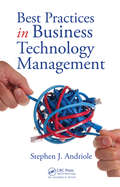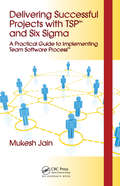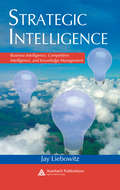- Table View
- List View
Modeling Software Behavior: A Craftsman's Approach
by Paul C. JorgensenThis book provides engineers, developers, and technicians with a detailed treatment of various models of software behavior that will support early analysis, comprehension, and model-based testing. The expressive capabilities and limitations of each behavioral model are also discussed.
Cloud Computing: Technologies and Strategies of the Ubiquitous Data Center
by Curtis Franklin Jr. Brian J.S. CheeModern computing is no longer about devices but is all about providing services, a natural progression that both consumers and enterprises are eager to embrace. As it can deliver those services, efficiently and with quality, at compelling price levels, cloud computing is with us to stay. Ubiquitously and quite definitively, cloud computing is
Wireless Sensor Networks: Principles and Practice
by Fei Hu Xiaojun CaoWritten by award-winning engineers whose research has been sponsored by the U.S. National Science Foundation (NSF), IBM, and Cisco's University Research Program, Wireless Sensor Networks: Principles and Practice addresses everything product developers and technicians need to know to navigate the field. It provides an all-inclusive examina
Information Security Management: Concepts and Practice
by Bel G. RaggadInformation security cannot be effectively managed unless secure methods and standards are integrated into all phases of the information security life cycle. And, although the international community has been aggressively engaged in developing security standards for network and information security worldwide, there are few textbooks available that
Handbook of Computer Vision Algorithms in Image Algebra
by Joseph N. Wilson Gerhard X. RitterImage algebra is a comprehensive, unifying theory of image transformations, image analysis, and image understanding. In 1996, the bestselling first edition of the Handbook of Computer Vision Algorithms in Image Algebra introduced engineers, scientists, and students to this powerful tool, its basic concepts, and its use in the concise representation
Java Programming for Engineers
by Julio Sanchez Maria P. CantonWhile teaching Java programming at Minnesota State University, the authors noticed that engineering students were enrolling in Java programming courses in order to obtain basic programming skills, but there were no Java books suitable for courses intended for engineers. They realized the need for a comprehensive Java programming tutorial that offer
Joint Cognitive Systems: Patterns in Cognitive Systems Engineering
by Erik Hollnagel David D. WoodsOur fascination with new technologies is based on the assumption that more powerful automation will overcome human limitations and make our systems 'faster, better, cheaper,' resulting in simple, easy tasks for people. But how does new technology and more powerful automation change our work? Research in Cognitive Systems Engineering (CSE) l
Wireless Crime and Forensic Investigation
by Gregory KipperSecurity is always a concern with any new technology. When we think security we typically think of stopping an attacker from breaking in or gaining access. From short text messaging to investigating war, this book explores all aspects of wireless technology, including how it is used in daily life and how it might be used in the future. It provides a one-stop resource on the types of wireless crimes that are being committed and the forensic investigation techniques that are used for wireless devices and wireless networks. The author provides a solid understanding of modern wireless technologies, wireless security techniques, and wireless crime techniques, and shows how to conduct forensic analysis on wireless devices and networks. Each chapter, while part of a greater whole, is self-contained for quick comprehension.
Statistical Data Mining Using SAS Applications (Chapman & Hall/CRC Data Mining and Knowledge Discovery Series)
by George FernandezStatistical Data Mining Using SAS Applications, Second Edition describes statistical data mining concepts and demonstrates the features of user-friendly data mining SAS tools. Integrating the statistical and graphical analysis tools available in SAS systems, the book provides complete statistical data mining solutions without writing SAS program co
The Decision Model: A Business Logic Framework Linking Business and Technology
by Barbara von Halle Larry GoldbergIn the current fast-paced and constantly changing business environment, it is more important than ever for organizations to be agile, monitor business performance, and meet with increasingly stringent compliance requirements. Written by pioneering consultants and bestselling authors with track records of international success, The Decision Model: A
Enterprise Business Architecture: The Formal Link between Strategy and Results
by Ralph Whittle Conrad B. MyrickA critical part of any company's successful strategic planning is the creation of an Enterprise Business Architecture (EBA) with its formal linkages. Strategic research and analysis firms have recognized the importance of an integrated enterprise architecture and they have frequently reported on its increasing value to successful companies. Enterpr
Piezoelectric Materials and Devices: Applications in Engineering and Medical Sciences
by M. S. VijayaStarting from the fundamentals, this book provides a concise yet complete treatment of piezoelectric materials, an important class of smart materials which are useful as both actuators and sensors. Including case studies, the text introduces different types of dielectric materials, describes the preparation and properties of various piezoelectric materials used in device applications, and presents various engineering and medical applications of piezoelectric materials. It also discusses in detail the design and virtual prototyping of piezoelectric devices using commercially available software tools like ANSYS and PAFEC.
IP Communications and Services for NGN
by Johnson I AgbinyaRapid deployment and acceptance of broadband networks, including the 802.11 a/b/g, 3G cellular networks, WiMAX, and emerging 4G cellular IP networks, have sparked a growing reliance on voice over IP and the quickly emerging IP TV and Mobile TV. Providing the necessary background and technical understanding to stay abreast of and even ahead of the IP trend, IP Communications and Services for NGN explores IP development for the delivery of next generation mobile services. Packed with detailed illustrations, this cutting-edge reference examines the primary IP protocols (IPv4 and IPv6), real-time protocols, and three major IP services (VoIP, IPTV, and Mobile TV). It clearly explains the different architectures of fixed, mobile, and wireless networks along with the major advantages and disadvantages of each. It includes coverage of the latest in:The VoIP MarketSCTP and Vertical HandoffRSVP: Resource Reservation ProtocolMPLS: MultiProtocol Label SwitchingSIP: Session Initiation ProtocolIMS: IP Multimedia SubsystemRTSP: Real-Time Streaming ProtocolRTP: Real-Time Transport ProtocolIPTV System Architectures and IPTV System DescriptionsWith a detailed listing of commonly used acronyms, along with a clear description of the role IP is likely to play in the development of next generation mobile services, this book provides educators, industry practitioners, regulators, and subscribers with the ideal starting point for developing the understanding required to deploy, train, and use IP services effectively and efficiently.
Image Processing with MATLAB: Applications in Medicine and Biology
by Omer Demirkaya Musa H. Asyali Prasanna K. SahooImage Processing with MATLAB: Applications in Medicine and Biology explains complex, theory-laden topics in image processing through examples and MATLAB algorithms. It describes classical as well emerging areas in image processing and analysis. Providing many unique MATLAB codes and functions throughout, the book covers the theory of probability an
Architecture and Principles of Systems Engineering (Complex and Enterprise Systems Engineering)
by Charles Dickerson Dimitri N. MavrisThe rapid evolution of technical capabilities in the systems engineering (SE) community requires constant clarification of how to answer the following questions: What is Systems Architecture? How does it relate to Systems Engineering? What is the role of a Systems Architect? How should Systems Architecture be practiced?A perpetual reassessment of concepts and practices is taking place across various systems disciplines at every level in the SE community. Architecture and Principles of Systems Engineering addresses these integral issues and prepares you for changes that will be occurring for years to come. With their simplified discussion of SE, the authors avoid an overly broad analysis of concepts and terminology. Applying their substantial experience in the academic, government, and commercial R&D sectors, this book is organized into detailed sections on: Foundations of Architecture and Systems Engineering Modeling Languages, Frameworks, and Graphical Tools Using Architecture Models in Systems Analysis and Design Aerospace and Defense Systems Engineering Describing ways to improve methods of reasoning and thinking about architecture and systems, the text integrates concepts, standards, and terminologies that embody emerging model-based approaches but remain rooted in the long-standing practices of engineering, science, and mathematics. With an emphasis on maintaining conceptual integrity in system design, this text describes succinct practical approaches that can be applied to the vast array of issues that readers must resolve on a regular basis. An exploration of the important questions above, this book presents the authors’ invaluable experience and insights regarding the path to the future, based on what they have seen work through the power of model-based approaches to architecture and systems engineering.
Improving Business Process Performance: Gain Agility, Create Value, and Achieve Success
by Joseph RaynusThe managerial practices that successfully drove industry for decades have become insufficient to support the rapidly changing business landscape. Companies around the world are being challenged to improve performance, reshape operations, and adapt swiftly to new opportunities. With an abundance of improvement methodologies and frame
Server Management (Best Practices)
by Gilbert HeldThis single-volume desktop reference provides comprehensive information on all server issues - featuring contributions from experts in the field. Engineers for system vendors, systems integrators, major resellers, end-users, and representatives from Hewlett-Packard, Novell, IBM, Compaq, Microsoft, and NEC share their ideas and experience on such to
Technological Advances in Interactive Collaborative Learning
by Nia Alexandrov Raul Ramirez Velarde Vassil AlexandrovExploring the latest developments in the technology and pedagogy of higher education, Technological Advances in Interactive Collaborative Learning presents information technology-oriented educational programs for the next generation of scientists and researchers. It highlights the importance of technology, pedagogy, and management in the higher edu
Practical Hacking Techniques and Countermeasures
by Mark D. SpiveyPractical Hacking Techniques and Countermeasures examines computer security from the hacker's perspective, demonstrating how a security system can be designed and structured to repel an attack. This book shows how an attack is conceptualized, formulated and performed. With the VMware Workstation software package available on the accompanying CD, it uses virtual computers to illustrate how an attack is executed, including the script, compilation, and results. It offers examples of attacks on Windows and Linux. It also covers such topics as footprinting, scanning, sniffing, passwords, and other attack tools. This text provides valuable information for constructing a system to defend against attacks.
What Every Engineer Should Know About Developing Real-Time Embedded Products (What Every Engineer Should Know)
by Kim R. FowlerYou can find them in your wristwatch or MP3 player; they perform specific functions in washing machines, traffic lights, and even pacemakers. Embedded systems are pervasive, ubiquitous, and widespread throughout our daily lives. Developing these real-time embedded products requires an understanding of the interactions between different disciplines,
Practical Handbook on Image Processing for Scientific and Technical Applications
by Bernd JahneThe second edition of a bestseller, this book is a practical guide to image processing for the natural and technical sciences community. Students, practitioners, and researchers can gain immediate access to a sound basic knowledge of image processing by referencing general principles in the natural sciences. The book describes carefully selected algorithms in detail and demonstrates real-world applications that show the reader how to solve complex image processing problems. Hundreds of photos, figures, diagrams, and tables illustrate the text, and numerous well-organized tips save countless hours in the practical handling of image acquisition and processing.
Implementation and Applications of DSL Technology
by Hervé Dedieu Krista S. Jacobsen Philip GoldenThe digital subscriber line (DSL) industry is expanding rapidly and a technology once thought to be only transitional will soon clear $100 billion in total annual service revenue. From the world's leading DSL experts, Implementation and Application of DSL Technologies builds upon the theory presented in Fundamentals of DSL Technologies
Best Practices in Business Technology Management
by Stephen J. AndrioleDiscussing specific best practices for making specific decisions, this book offers qualitative and quantitative methods, tools, and techniques for deploying and supporting all kinds of information technology. It identifies the range of technology decisions that managers make and the best practices that define good acquisition, deployment, and support decisions, all in an easy to absorb, conversational tone. The book covers the interrelated business technology alignment areas of business strategy as well as technology applications, architecture, infrastructure, support, acquisition, and organization. Each section ends with a summary of actionable best practices.
Delivering Successful Projects with TSP(SM) and Six Sigma: A Practical Guide to Implementing Team Software Process(SM)
by Mukesh JainDelivering successful projects means the ability to produce high quality software within budget and on time-consistently, but when one mentions quality to software engineers or project managers, they talk about how impossible it is to eliminate defects from software. This assumption is passed on and on until it becomes accepted wisdom, with the power of a self-fulfilling prophecy. And when a project fails to arrive on time or up to standards, team members will turn on each other. The project got delayed because the engineers did a poor job in development or too much was promised upfront for this short of a timeline.In Delivering Successful Projects with TSPSM and Six Sigma: A Practical Guide to Implementing Team Software ProcessSM, you will learn how to effectively manage the development of a software project and deliver it in line with customer expectations. This refreshing volume -Offers real-world case studies about the author's experience at Microsoft successfully implementing TSP to achieve higher quality softwareEmpowers software developers to take responsibility for project managementExplains how Six Sigma and TSP combined can dramatically reduce software defectsBy applying these principles put forth by one of the most respected names in software development, your software team will learn how to function as a team and turn out products where zero defects and on-time delivery are the norm.
Strategic Intelligence: Business Intelligence, Competitive Intelligence, and Knowledge Management
by Jay LiebowitzStrategic intelligence (SI) has mostly been used in military settings, but its worth goes well beyond that limited role. It has become invaluable for improving any organization's strategic decision making process. The author of Strategic Intelligence: Business Intelligence, Competitive Intelligence, and Knowledge Management recognizes synergies amo
